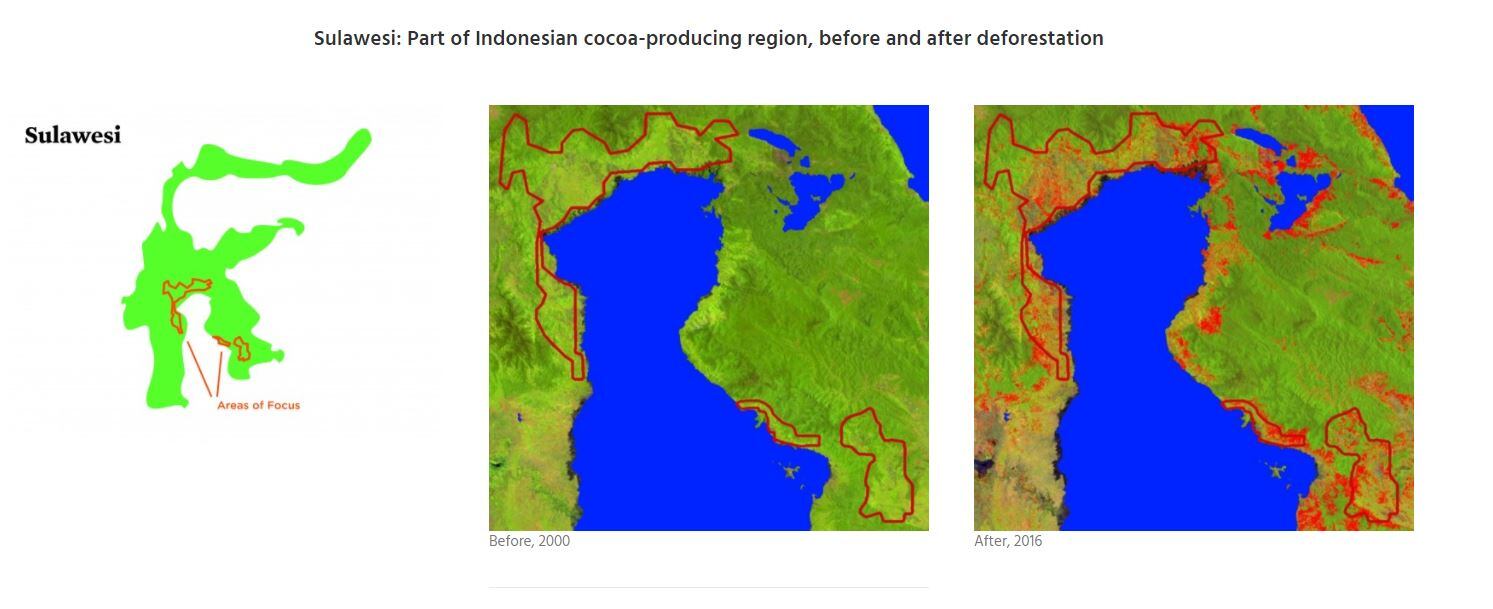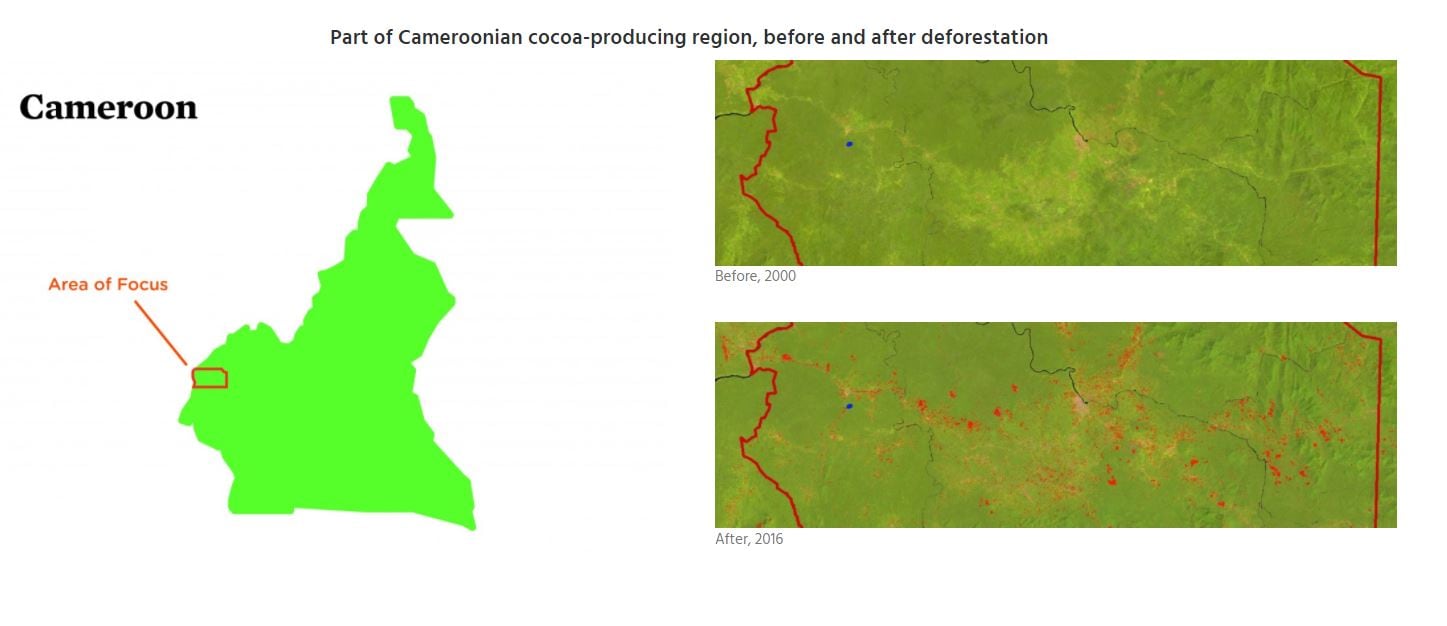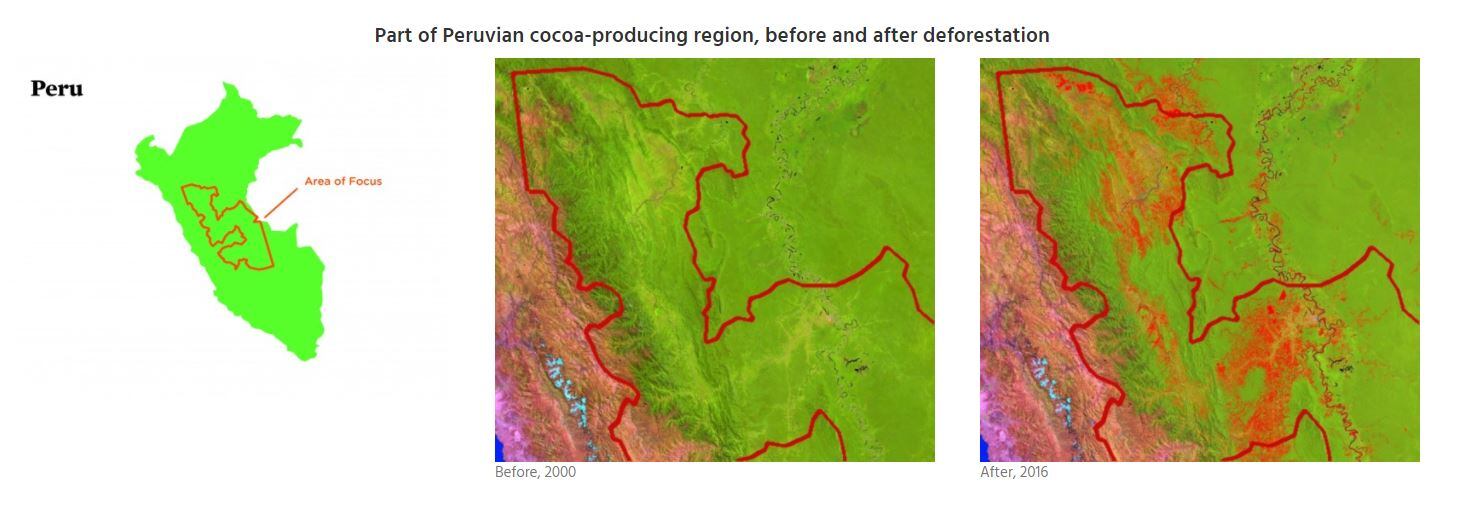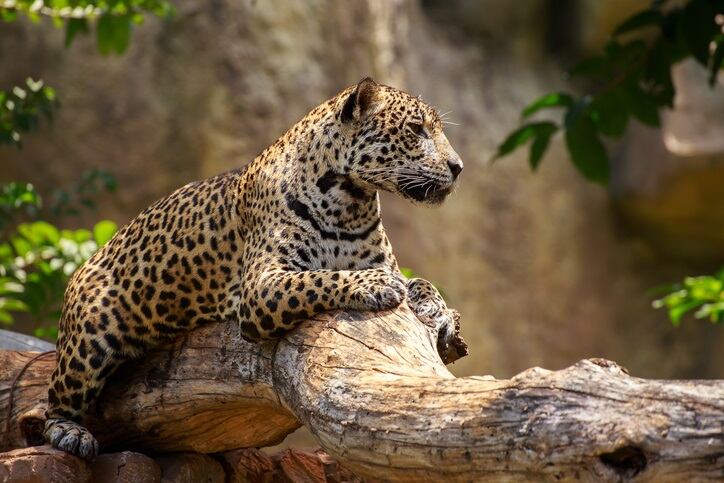Satellite mapping by Mighty Earth identified loss of forest cover in cocoa growing hotspots in the four countries. It presented findings in a Valentine’s Day report “Kissed by Deforestation”.
Industry sustainability organization, The World Cocoa Foundation, said the studies were not new and said Mighty Earth was “out of sync” with other environmental groups who are partnering with industry. It added chocolate and cocoa companies are committed to curbing deforestation in all cocoa origins.
Mighty Earth’s latest report comes six months after the non-profit unearthed extensive cocoa-driven deforestation in Côte d’Ivoire and Ghana.
Leading chocolate and cocoa companies and the national governments in both countries committed to a framework for action under the newly formed Cocoa & Forests Initiatives at the UN Climate Change Conference (COP23) in November 2017, after announcing a statement of intent in March that year.
Satellite Maps: 2000 to 2016
The latest Mighty Earth report analyzed satellite maps of deforestation between 2000 and 2016.
Etelle Higonnet, Mighty Earth’s legal and campaign director, told ConfectioneryNews: “In satellite maps, you can quickly see what is not palm oil. Also what is not soy. So, pretty fast, you can tell that overwhelmingly this deforestation is not for palm (Indonesia, Cameroon) or soy (LatAm). You’re ruling out alternative drivers.
“You can also see if you zoom further in, what is a tree crop vs forest canopy,” she added.

Mighty Earth coupled mapping with national and regional agricultural export data to rule out deforestation driven by other crops.
Export data showed Peruvian cocoa production expanded fifteen fold in under a decade from 4,263 metric tons (MT) exported in 2007 to 61,888 MT in 2016.
“I’m willing to bet you dinner & champagne at the fanciest restaurant of your choice that this almost all happened in forested areas. It’s not like Peruvian farms magically got 15 times more productive,” even accounting for coca (for cocaine) conversion to cocoa, said Higonnet.
“This whole analysis process leads us to believe there is a high risk that cocoa has likely been driving large-scale deforestation in cocoa-producing areas of Cameroon, Indonesia, Peru and Ecuador," she said.

What more can companies do?
Mighty Earth is calling on companies not yet signed on to the Cocoa & Forests Initiative to join the pledge.
It hopes the 25 companies already part of the initiative will expand commitments beyond Côte d’Ivoire and Ghana to cover all cocoa origins.
“The Cocoa & Forests Initiative should cover all forests worldwide,” said Higonnet.
“There should be initiatives similar to the Ghana and Côte d’Ivoire Frameworks for Action in Peru, Ecuador, Indonesia and Cameroon and other cocoa-producing nations.”

The campaign director said all forward-looking commitments to stop new deforestation should be coupled with a pledge for 100% of each company’s cocoa to come from shade-grown agroforestry to fix damage already done.
“This will shift cocoa from a forest-killing commodity to a forest-friendly commodity and help re-green the six million hectares of cocoa in West Africa, much of which is full sun cocoa,” she said.
Hershey has committed to not sourcing cocoa from anywhere in the world where new deforestation has occurred, while Barry Callebaut pledges to be deforestation-free for cocoa by 2025.

WCF: ‘Top priority’ for industry
Rick Scobey, president of the World Cocoa Foundation (WCF), whose members include Mars, Mondelēz and Ferrero, said Mighty Earth’s studies were not new.
Signatories of the Cocoa and Forests Initiative frameworks in Côte d’Ivoire and Ghana
Arysta Callivoire, Barry Callebaut, Blommer Chocolate, Cargill, Cémoi, Cocoanect, Cococo Chocolatiers, ECOM, Ferrero, General Mills, Godiva Chocolatier, Guittard Chocolate Company, Hershey, Lindt & Sprüngli Group Marks & Spencer Food, Mars Wrigley Confectionery, Meiji Co., Ltd. Mondelēz Europe, Nestlé, Olam Cocoa, Sainsbury's, Toms Group, Toutonm Tree Global and J.H. Whittaker & Sons.
What have they committed to? Find out more HERE.
However, Scobey added eliminating deforestation in the cocoa supply chain is a “top priority” for the global cocoa and chocolate industry.
He told this site the Cocoa & Forests Intiative Frameworks in Côte d’Iviore and Ghana will be expanded to other geographies based on lessons learnt in West Africa.
“We believe that many of the principles, approaches and commitments contained in the recently signed Frameworks are of global relevance and applicability,” he said.
Rick Scobey: Income increases through productivity key
Scobey added: “In the four countries flagged by Mighty Earth, WCF member companies are making significant investments on the ground to end deforestation and promote forest restoration.

“The top priority is sustainable agricultural production and increased farmer incomes - these are essential pre-requisites for reducing pressure for agricultural encroachment into forests, and strengthening the resilience of cocoa farmers to climate change,” he said.
“Income increases could be achieved by upping productivity on existing land though improved planting materials, training in good agricultural practices, soil fertility, land tenure reform, intercropping and capacity building of farmers’ organizations,” said the WCF chief.
Mighty Earth ‘out of sync’, says WCF
“The Mighty Earth critique of cocoa in the Amazon is out of sync with the strategic focus of other global environmental groups like WWF, the Nature Conservancy, and IUCN,” he continued.
“These organizations are partnering with the cocoa and chocolate industry to support the reforestation of degraded landscapes in the Amazon with cocoa-agroforestry, thereby generating a mix of economic, social and environmental benefits for indigenous communities.”
He said, for example, WCF member Chocolats Halba is promoting reforestation in the Peruvian Amazon by incorporating native hardwood trees around cocoa plantations.
European Commission on cocoa deforestation

Earlier this month, the European Commission said in response to a question in European Parliament it was "aware of and concerned" by cocoa-driven deforestation. It said it was supporting sector reforms in Ghana and Côte d’Ivoire. It added it would “continue to promote fair and ethical production, to ensure decent prices, improve producers' livelihoods and tackle deforestation". ConfectioneryNews has asked the Commission how it can 'ensure decent prices', but has not recieved a response.
